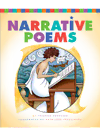Table Of ContentPage intentionally blank
NARR ATIVE
POEMS
B Y Y V O N N E P E A R S O N
I L L U S T R A T E D B Y K A T H L E E N P E T E L I N S E K
About the Author
Published by The Child’s World®
1980 Lookout Drive • Mankato, MN 56003-1705 Yvonne Pearson is a poet and a
800-599-READ • www.childsworld.com social worker. She has published
many poems and won contests. She
ACKNOWLEDGMENTS
writes essays and books, too. She
The Child’s World®: Mary Berendes, Publishing Director
lives in Minneapolis, Minnesota.
Red Line Editorial: Editorial direction
She also lives in California near her
The Design Lab: Design and production
grandchildren part of each year. Her
www.yvonnepearson.com
Photographs ©: Jorge Salcedo/Thinkstock, 6; iStock/ Web site is .
Thinkstock, 10; Fuse/Thinkstock, 13
About the Illustrator
Copyright © 2015 by The Child’s World®
Kathleen Petelinsek is a graphic
All rights reserved. No part of this book may be
designer and illustrator. She has been
reproduced or utilized in any form or by any means
designing and illustrating books for
without written permission from the publisher.
children for 20 years. She lives in
ISBN 9781631436994 Minnesota with her husband, two
LCCN 2014945308 dogs, a cat, and three fancy chickens.
Printed in the United States of America
Mankato, MN
November, 2014
PA02240
N A R R A T I V E P O E M S
TA B L E O F C O N T E N T S
C H A P T E R O N E
What Is a Poem? . . . . . . . . . . . . . . . . . . . . . .4
C H A P T E R T W O
Rhyme and Rhythm . . . . . . . . . . . . . . . . 10
C H A P T E R T H R E E
Epics and Ballads . . . . . . . . . . . . . . . . . . . 16
Tips for Young Poets ...............22
Glossary ...........................23
To Learn More .....................24
Index ..............................24
N A R R A T I V E P O E M S
P T E R
A O
H
N
C 1 E
What Is a Poem?
“Ring around the rosie, a pocket full
of posies.” Have you said this on the
playground? Did you know you were
reciting a poem? Have you ever said
“Eenie meenie miney moe”? You were
saying a poem!
Poems have been part of people’s lives
for thousands of years. Poetry helps people
remember things they care about. It can
also remind readers of certain emotions.
Poetry can even teach readers to look at
something in a whole new way.
4
Poetry can be about anything. It can describe
things you see. But it can also be about things
you imagine.
Poetry usually says a lot with a few words.
A poem is often written in lines instead of sentences.
A line can be very long. Or it can be as short as
one or two words! Poets usually try to use words in
ways that are pleasing to listen to. They often use
descriptive words. Poets try to write poems that help
readers picture what the poem is about.
5
W H AT I S A N A R R AT I V E P O E M ?
A narrative poem tells a story. In fact, that’s the only
rule of narrative poetry! Like any story, narrative
poetry has a beginning, middle, and end. A narrative
poem has a plot. This is made up of the events that
happen in a story. It has a setting. This is where the
story takes place. Narrative poems have characters.
These are the people or animals that appear in a story.
“Paul Revere’s Ride” is a famous narrative poem by Henry Wadsworth
Longfellow. It is about the time when America fought for independence
from Great Britain. The poem tells the story of Paul Revere, who goes on a
brave horseback ride to warn colonists that British soldiers are coming.
6
Narrative poems often start out with a description
of the setting and the main character.
Many narrative poems are fiction. This means
they are made-up stories. Some narrative poems
are nonfiction. These are true stories.
People have used narrative poetry to tell stories
for thousands of years. In ancient times, people
used narrative poems to tell their history. Books
were not yet common. Groups listened to poems.
People still read and listen to narrative poems.
Perhaps you have heard of “Casey at the Bat” by
Ernest Thayer. It is an exciting narrative poem
about baseball. “The Walrus and the Carpenter” is
a silly poem written by Lewis Carroll. It is about
a walrus and a carpenter who go for a walk on the
beach. They trick some oysters into walking with
them. Then they eat the oysters!
7
Carlos and His Dog
Young Carlos was a little boy.
He just turned ten years old.
He lived in a house beside a lake
and when it was no longer cold
he took his dog out for a walk
in the forest dark and deep.
He hoped to see if bears had left
their dens at last to eat.
But the dog didn’t know that bears,
like boys and girls, of course,
get cranky when they’re hungry
and growl and snarl and worse.
The dog got excited and jumped right up
to lick a big bear’s nose.
The bear swiped the dog with his paw.
The dog—he cried and rose.
8

